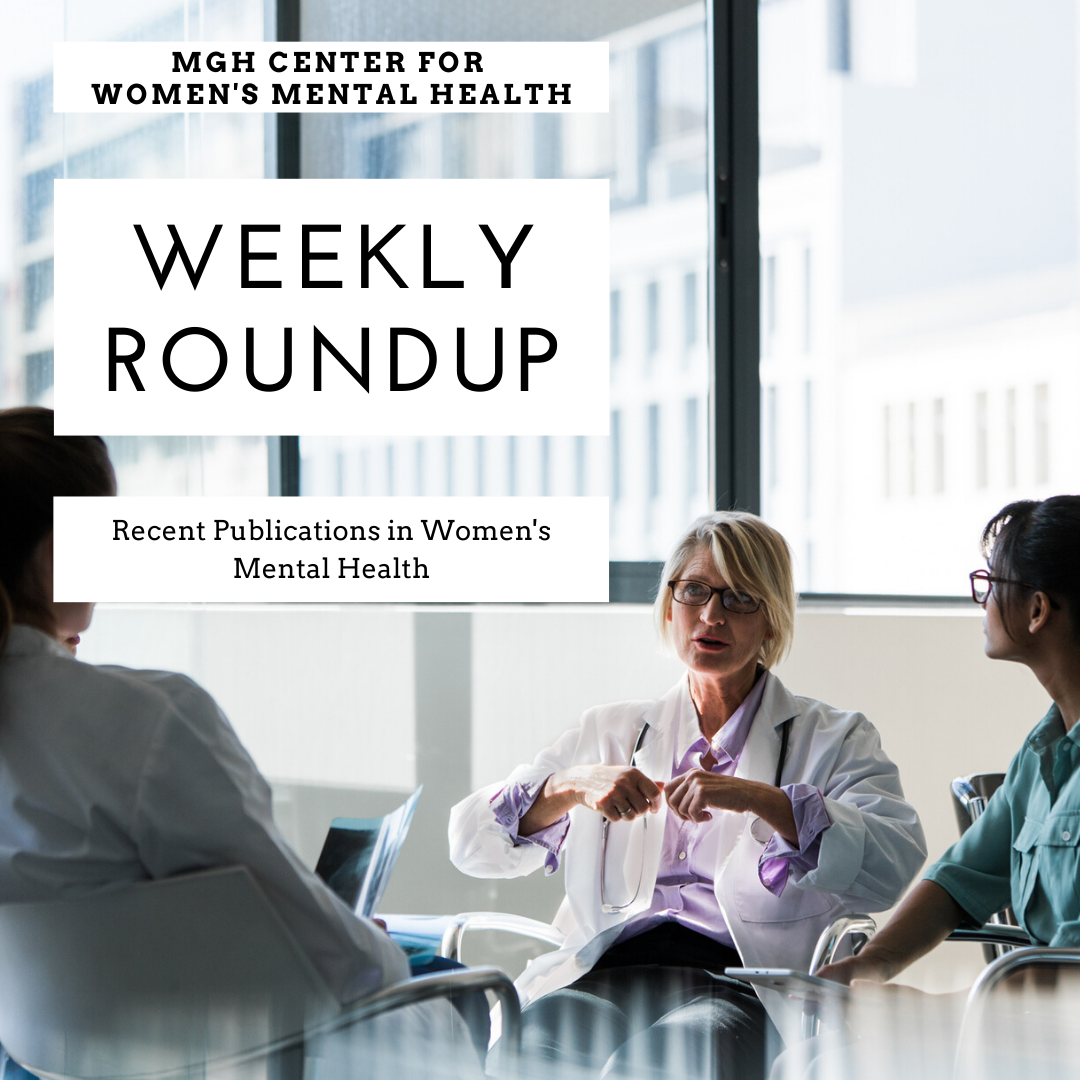
Every week we review the most recent publications in women’s mental health, covering topics related to premenstrual symptoms, perinatal mood and anxiety disorders, use of medications in pregnant and breastfeeding women, perinatal substance use, and menopausal mental health.
For more detailed descriptions of many of these topics, you can sign up to receive our weekly CWMH NEWSLETTER which comes out every Thursday.
And don’t forget to visit ESSENTIAL READS – a curated selection of up-to-date and clinically relevant articles in women’s mental health.
Ruta Nonacs, MD PhD
PMS AND PMDD |
| No articles this week |
INFERTILITY AND MENTAL HEALTH |
| No articles this week |
PSYCHIATRIC ILLNESS DURING PREGNANCY |
| Screening programs for common maternal mental health disorders among perinatal women: report of the systematic review of evidence.
Waqas A, Koukab A, Meraj H, Dua T, Chowdhary N, Fatima B, Rahman A.BMC Psychiatry. 2022 Jan 24;22(1):54. Free article. Screening associated with improved outcomes in mothers, with decreases in perinnatal depressive symptoms and anxiety. Liu X, Molenaar N, Agerbo E, Momen NC, Rommel AS, Lupattelli A, Bergink V, Munk-Olsen T. PLoS Med. 2022 Jan 31;19(1):e1003895. Discontinuing antidepressant medication during pregnancy (but not before) is associated with an apparent increased risk of psychiatric emergency compared to continuing treatment throughout pregnancy. |
MEDICATIONS AND PREGNANCY |
| No articles this week |
POSTPARTUM PSYCHIATRIC ILLNESS |
| Yang ST, Yang SQ, Duan KM, Tang YZ, Ping AQ, Bai ZH, Gao K, Shen Y, Chen MH, Yu RL, Wang SY. The development and application of a prediction model for postpartum depression: optimizing risk assessment and prevention in the clinic. J Affect Disord. 2022 Jan 1; 296:434-442.
In women at high risk, ketamine administered at delivery decreased risk for PPD. Depression in the Postpartum Year and Life Course Economic Trajectories. Rokicki S, McGovern M, Von Jaglinsky A, Reichman NE. Am J Prev Med. 2022 Feb;62(2):165-173. Experiencing a major depressive episode within the first year after delivery had a strong and sustained positive association with material hardship and not working for pay in years 3, 5, 9, and 15 after delivery. Genova F, Neri E, Trombini E, Stella M, Agostini F. J Affect Disord. 2022 Feb 1; 298(Pt A):182-189. Greater prematurity was associated with higher risk for postpartum depressive symptoms, however symptoms improvemed over the course of the year. Hildingsson I, Rubertsson C. BMC Pregnancy Childbirth. 2022 Jan 25;22(1):66. d Women with fear of birth and depressive symptoms both during pregnancy and postpartum showed the highest risk of impaired bonding after birth. Primiparity and being single were also associated with impaired bonding. Johnson KM, Thai A, Kington S. Birth. 2022 Jan 20. Perceived birth experience should be considered more central in assessing PPD. It may also be more robust than the PPD screeners used in practice, and therefore, could be a more reliable predictor of PPD. Van Lieshout RJ, Layton H, Savoy CD, Haber E, Feller A, Biscaro A, Bieling PJ, Ferro MA. Can J Psychiatry. 2022 Jan 21:7067437221074426. Participants in in the CBT group had statistically significantly greater reductions in PPD symptoms immediately post-treatment, were more likely to manifest a clinically significant improvement in EPDS scores (?4 points; OR = 3.44), and no longer have symptoms consistent with current MDD (OR = 5.31). Six months post-treatment, group CBT participants had higher odds of clinically significant PPD improvement (OR = 5.10), while 25% of the CBT group and 70% of remaining control group participants reported current MDD (p < 0.01). |
MEDICATIONS AND BREASTFEEDING |
| No articles this week |
PERINATAL SUBSTANCE USE |
| No articles this week |
MATERNAL MENTAL HEALTH AND CHILD OUTCOMES |
| Liu Y, Heron J, Hickman M, Zammit S, Wolke D. Prenatal stress and offspring depression in adulthood: The mediating role of childhood trauma. J Affect Disord. 2022 Jan 15; 297:45-52.
Both pre- and postnatal maternal depression and family adversity were associated with offspring depression at 24 years of age in simple logistic regression models. When all pathways were modeled simultaneously, only childhood trauma was directly associated with offspring depression. Complex chronic conditions among children born to women with schizophrenia. Toufeili A, Cohen E, Ray JG, Wilton AS, Brown HK, Saunders NR, Dennis CL, Holloway AC, Morrison KM, Hanley GE, Oberlander TF, Bérard A, Tu K, Barker LC, Vigod SN. Schizophr Res. 2022 Jan 21;241:24-35. Children born to women with schizophrenia are more likely to have chronic medical problems, particularly in the following domains: neuromuscular (AHR of 1.73, 1.28-2.33), cardiovascular (1.94, 1.64-2.29), respiratory (1.83, 1.32-2.54), hematology/immunodeficiency (2.24, 1.24-4.05) and other congenital or genetic defects (1.59, 1.16-2.17). |
MENOPAUSE AND MENTAL HEALTH |
| Adverse childhood experiences interact with inflammation and menopause transition stage to predict verbal memory in women.
Metcalf CA, Johnson RL, Novick AM, Freeman EW, Sammel MD, Anthony LG, Epperson CN. Brain Behav Immun Health. 2022 Jan 5;20:100411. Inflammation may mechanistically link ACEs and verbal memory for high ACE women during perimenopause. |
OTHER TOPICS IN WOMEN’S MENTAL HEALTH |
| No articles this week |



Leave A Comment